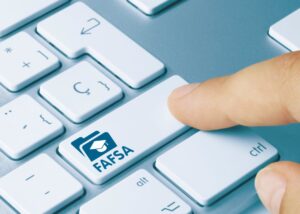As the 2023-24 school year wraps up, you may feel the promise of a relaxing summer and assume there is nothing left to do. However, you should know that changes and delays to this year’s Free Application for Federal Student Aid (FAFSA) mean that deadlines for many essential grants have been pushed back, and you still have time to apply.
What are grants and how do they differ from scholarships?
Scholarships and Grants are both ways to get additional financial aid for school. Unlike student loans, they do not need to be repaid.
Grants are based on a person’s financial need, which is why it is essential to fill out your FAFSA to be considered for grant funds. Grants available to Missouri students include Access Missouri and the Fast Track Workforce Incentive Grant.
Scholarships are based on merit. For example, students who perform well on the ACT qualify for the Bright Flight Program. There are many scholarships available on a local, state, and national scale. All of these scholarships have their deadlines, so make sure you check in and see if there are any still available to apply for.
What are priority deadlines?

Priority deadlines for grants are meant to guarantee funding to those who apply early. While this may seem make-or-break to some, there is a final deadline that gives students more time to apply.
This year, the final deadline for Access Missouri is June 1, 2024. If you are eligible, you can still receive grant money. The Missouri Department of Higher Education and Workforce Development (MDHEWD) has been able to fully fund every applicant based on their maximum Expected Family Contribution (EFC) Award for the past three years. Based on funding available and FAFSA filing rates, that appears to be the case for everyone who applies for the Access Missouri Grant before the 2024-25 deadline as well.
How can I determine if I’m eligible and apply?
The eligibility requirements can be found on the MDHEWD website. The Student Portal is also an essential tool for arranging your information for grants from the state of Missouri.
The MDHEWD Student Portal provides you with information on how to plan and pay for college. This includes all information relating to your eligibility for MDHEWD’s student financial aid programs including Access Missouri, Bright Flight, and Fast Track. You can even directly apply to the state financial aid programs listed in the previous sentence as well as several others.
The Student Workspace is also accessible through the Student Portal. There, you can save information related to planning and paying for college, as well as finishing a degree or certificate.
With warmer weather and summer fun coming quickly, it will be a relief to get all of your financial aid sorted beforehand. So sit back and relax knowing that you have used all the tools in your power to make sure next school year is as cool as ice cream.

 Help with creating an account and preparing for the FAFSA is available during free FAFSA Frenzy: FSA ID events in November and December. Check out the
Help with creating an account and preparing for the FAFSA is available during free FAFSA Frenzy: FSA ID events in November and December. Check out the 